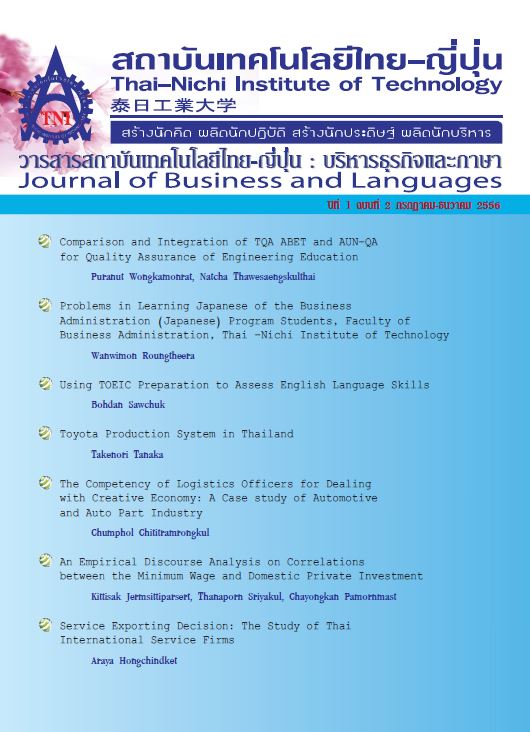An Empirical Discourse Analysis on Correlations between the Minimum Wage and Domestic Private Investment
Main Article Content
Abstract
This research has an objective to empirically analyze on the discourse about correlations between the minimum wage and domestic private investment, which has been criticized severely by the authorities, especially since the Pua Thai Party’s policy announcement on the guarantee of labors’ minimum wage at 300 baht per day. The research employs an advanced quantitative methodology, analyzing time-series data of the minimum wage, import of capital goods and domestic machinery sales by regression and the Johansen Cointegration Test. The regression analysis reveals that the minimum wage correlates in the same direction with both imports of capital goods and domestic machinery sales, whereas when applied the Johansen Cointegration Test, the findings surprisingly indicate that they do not possess any cointegration. This indicates that the claim that the minimum wage increase will affect the domestic private investment, has been reinforced by the authorities using their superior status to dominate the process of building a body of knowledge as well as to distort the truth so as to possess a control over the society. This is thus not a good-faith mistake but an effort of discourse fights on the economic unfairness and social-class discrimination, which is the root of Thailand’s important structural problems.
Article Details
Article Accepting Policy
The editorial board of Thai-Nichi Institute of Technology is pleased to receive articles from lecturers and experts in the fields of business administration, languages, engineering and technology written in Thai or English. The academic work submitted for publication must not be published in any other publication before and must not be under consideration of other journal submissions. Therefore, those interested in participating in the dissemination of work and knowledge can submit their article to the editorial board for further submission to the screening committee to consider publishing in the journal. The articles that can be published include solely research articles. Interested persons can prepare their articles by reviewing recommendations for article authors.
Copyright infringement is solely the responsibility of the author(s) of the article. Articles that have been published must be screened and reviewed for quality from qualified experts approved by the editorial board.
The text that appears within each article published in this research journal is a personal opinion of each author, nothing related to Thai-Nichi Institute of Technology, and other faculty members in the institution in any way. Responsibilities and accuracy for the content of each article are owned by each author. If there is any mistake, each author will be responsible for his/her own article(s).
The editorial board reserves the right not to bring any content, views or comments of articles in the Journal of Thai-Nichi Institute of Technology to publish before receiving permission from the authorized author(s) in writing. The published work is the copyright of the Journal of Thai-Nichi Institute of Technology.
References
N. Mektrairat, “Political Discourse on Thai Democracy,” Social Sciences Book, vol. 12, pp. 15-36, 1989.
M. Alvesson and D. Karreman, “Varieties of Discourse: On the Study of Organizations through Discourse Analysis,” Human Relations, vol. 53, pp.1125-1149, 2000.
C. Charoensin-o-larn, Development Discourse: Power, Knowledge, Truth, Identity and Otherness, 4th ed., Bangkok, Thailand: Wipasa, 2006.
F. Vighi and H. Feldner, “Ideology Critique or Discourse Analysis?: Zizek against Foucault,” European Journal of Political Theory, vol. 6, pp. 141-159, 2007.
J. Cheek, “At the Margins? Discourse Analysis and Qualitative Research,” Qualitative Health Research, vol. 14, pp. 1140-1150, 2004.
T. van Dijk, Ed., Discourse Studies, London, England: Sage, 2007, 5 vols.
B. Hodge, A. Kuper and S. Reeves, “Qualitative Research: Discourse Analysis,” British Medical Journal, no. 337, pp. 570- 572, 2008.
D. Freshwater, J. Cahill, E. Walsh and T. Muncey, “Qualitative Research as Evidence: Criteria for Rigour and Relevance,” Journal of Research in Nursing, vol. 15, pp. 497-508, 2010.
G. Stillar, Analyzing Everyday Texts: Discourse, Rhetoric, and Social Perspectives, California, United States of America: Sage, 1998.
“The Joint Standing Committee on Commerce, Industry and Banking Opposed 300 Baht Wage-Investment to Plummet Hundred Billion,” Post Today, Jul. 20, 2011. [Online]. Available: https://bit.ly/mQizU8.
Matichon, pp. 17, Aug. 15, 2011.
K. Jermsittiparsert, T. Sriyakul and C. Pamornmast, “An Empirical Proposal on Power, Knowledge and Truth of Correlations among the Minimum Wage, Foreign Direct Investment in the Industrial Sector and Export,” MUT Journal of Business Administration, vol. 8, pp. 1-12, 2011.
T. Sorat. (2011) The 300 Baht per Day Wage Policy and the Competitiveness of Thailand. [Online]. Available: https://www.fti.or.th/2008/ftidivision/thai/newsdetail.aspx?sid=32&id=188.
“Second-Half Slowdown of Investment in Factories, Effects of 300 Baht Wage in Cost Increase, Many Risking Close of Business in 2012,” Prachachat Turakit, Jul 15, 2011. [Online]. Available: https://www.prachachat.net/news_detail.php?newsid=1310709294&grpid=&catid=&subcatid=0000.
“Shock, Wage Increase, New Factories Decline,” Thai Post, Aug 1, 2011. [Online]. Available: https://www.fti.or.th2008/ftidivision/thai/newsdetail.aspx?sid=32&id=188.
Ministry of Labor, Table Shows the Minimum Wage and Enforce (Since 1973-present), 2011.
Bank of Thailand, Private Investment Indicators, 2011.
S. Johansen, “Statistical Analysis of Cointegration Vectors,” Journal of Economic Dynamics and Control, vol. 12, pp. 231-254, 1988.
S. Johansen, “Cointegration and Hypothesis Testing of Cointegration Vectors in Gaussian Vector Autoregressive Models,” Econometrica, vol. 59, pp. 1551-1580, 1991.
G. Box and G. Jenkins, Time Series Analysis: Forecasting and Control, San Francisco, United States of America: Holden-Day, 1976.
M. Weber, The Theory of Social and Economic Organization, New York, United States of America: Free, 1977.
T. van Leeuwen, Discourse and Practice: New Tools for Critical Discourse Analysis. Oxford, United Kingdom: Oxford University Press, 2008.
T. van Dijk. (n.d.) What do we mean by ‘Discourse Analysis’?. [Online]. Available: https://www.discourses.org/journals/das/whatisdiscourseanalysis/index.html.


